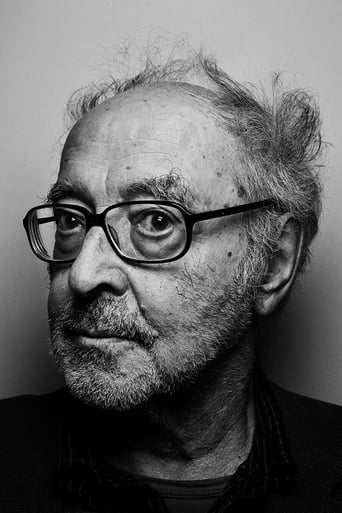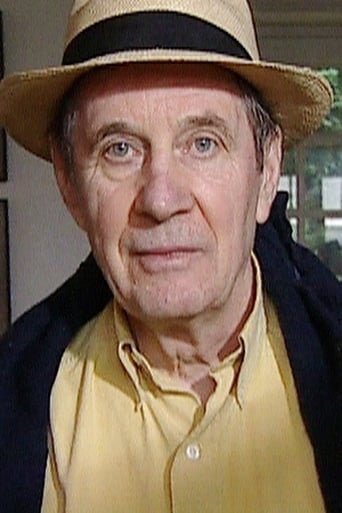JLG/JLG: Self-Portrait in December (1995)
Director Jean-Luc Godard reflects in this movie about his place in film history, the interaction of film industry and film as art, as well as the act of creating art.
Watch Trailer
Free Trial Channels
Cast


Reviews
Really Surprised!
Absolutely the worst movie.
It's a mild crowd pleaser for people who are exhausted by blockbusters.
This movie was so-so. It had it's moments, but wasn't the greatest.
This is not exactly the kind of film one would ever, ever, ever see in any multiplex on the planet- or for that matter in most of the art-house theaters. It's a home movie/essay/rumination/poetic ramble-on from the cranky crane of the French New Wave, Jean-Luc Godard, who filmed the bulk of this his Autoportrait in December in his home. We see him look over photos, write, pontificate about the disconnect of art in society, the nature of semantics, and so on and so on. Needless to say it isn't a complete waste of time from a filmmaker who's as equally talented and daring in his attacks on film style and method as he is a celluloid masturbating wild-man. I did find many of Godard's personally supervised camera set-ups, the tone of the shots, how long each one rests on himself in full ego-bound and ego-questioning glory, at least watchable and at best interesting in how there is some kind of form to the puzzle that Godard presents the audience.And yet it is, of course, a lot of times impenetrable because of his fervent disavowal of film as something that should be in the slightest bit conventional. I don't mind the central idea behind this approach to film-making, certainly from someone as confident- or at worst arrogant- as the bad boy of French cinema. But try as I might, what one ends up with is still more frustration than anything that can be easily taken away from it. Long gone are the trips into satirizing genre or deconstructing the narrative (yet keeping it) with philosophical and poetic tangents often from books. There is something worthwhile going on in JLG/JLG, but your guess is as good as mine. May be a masterpiece to the most stuck-up film buffs (not that one needs to be, per-say, but I'd imagine mostly snobs who push aside all other conventional product as pure waste), yet there is a reason it's mostly in obscurity as opposed to one of the Criterion releases.
I really don't want to be to hard with this movie just because I didn't liked it. The film has very interesting ideas and thoughts but well, they are just to boring for me. It is a typical postmodern movie which in my opinion would be better understood on a book. After all, self portraits are more usual found in paintings or who knows, perhaps even books, but films are a visual form of art. The film could be compared with Bergman's films because they both handle existentialism and are a good sample of the post modernism wave. Godard's self portrait is not an autobiography,it reflects how he feels about several subjects which include death and cinema. In my opinion, it is like he would have plugged a tape recorder into his brain in order to record his thoughts and then put this tape together with some images to produce a film. Perhaps if Virginia Wolf had lived in the 60's she would had been a very good friend of Godard and instead of becoming a writer, she could have become a filmmaker. So,I guess this movie is for the very intellectual kind of person who can bare a 102 Minutes boring to dead film, or, perhaps if you rent it, you can press the "stop" button every 10 minutes in order to think about what you just heard and then continue with the film, otherwise, you'll get lost with so much ideas in such a short period of time. oh! and Just for the record, I do like other Godard Films.
To see this work is to realize what becomes of a man whose monumental contributions to his craft/art came many decades prior. It's a shame that Jean-Luc Godard, grandmaster of the French New Wave, who once brought unprecedented spunk and verve to his films of the early 60's, all the while shattering and redefining most accepted cinematic notions for a new generation of filmgoers and filmmakers, now is forced to deal with his downfall. Yet he refuses to acknowledge the glaringly obvious fact that his magic touch has just about totally dissipated, for he has become so forlorn in his contempt of accepted societal expectations of film and in his need to further push his musings that the cinema is dead, that he is stuck within himself.In JLG/JLG, we get many, MANY quotes from philosophers and other high-thinkers, put to what use? Beats me. Juxtaposed with shots of rolling hills, ocean waves crashing onto rocky shores, Godard toying around with rolls of film, writing on large pads of paper, and then playing tennis, it all ads up to a nice variety of static images. Pedantic in tone and crusty in narration, the film nevertheless abruptly dispenses one though provoking moment when Godard explains his take on metaphysics via two interlocking triangles that form a 6-pointed star.Ultimately, I left the film with just one clear idea, albeit likely not one that Godard had intended - it is evident that for Godard, life does not imitate art; as, unlike his best films, he is going out with a whimper instead of a bang. Final Grade: D
This film, a companion piece to Hélas pour moi, is so rich in theme and idea that one can only begin to write about it. Godard's artistry (which as always, is total) works like a gadfly across many levels, and so maybe the best way to go about this is to list its main themes.* Swiss/French Nationality (father, homeland and identity)* Semiotics of Imagery (composition and idea, the duality of reality, technology)* Editing (blindness and sight)* Perception (phenomenology, the humanity of the image)* Music (the layered nature of sound association/interpretation)* Politics (current affairs and historical, Europe/America)* History (literature: in quotation - Rimbaud, Diderot, Kafka etc. and socio-political)* Oeuvre (reference and statement, responsibility and reputation)* Time (memory and culture as co-dependent, predictions and 'passing', death.)* Love (the portrait GIVES, JLG as affect)* Meditation (the reflective writer, interpretation & truth, translation and puns)* Cinema Industry (distributors, censors/classification)* Tennis (Proust)With so many themes, all patiently painted in close to an hour, we should admire Godard for his patent fluency. Even in the early 90s he is still at the height of his powers (despite the 70s rumours), much like the peak of the Baroque period several centuries ago.rino breebaart








